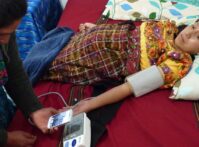-
The Scoop on Development Reform
June 6, 2009 By John SewellThe development reform picture became more complicated after a recent speech by Senate Foreign Relations Committee Chairman Senator John Kerry (D-MA) and congressional testimony by Deputy Secretary of State for Management and Resources Jack Lew.
Revamping State and USAID
At a Brookings Institution speech (transcript) on May 21 entitled “Diplomacy and Development in the 21st Century,” Kerry laid out the Senate Foreign Relations Committee’s plan for strengthening the civilian agencies that deal with these issues.
In the short term, Kerry favors the recruitment of more diplomatic and development professionals and a stronger emphasis on their training and education. He also expressed his desire to “untie the hands of our aid workers” by streamlining outdated regulations and rebalancing the relationship between Washington and the field.
“Over the long term, we need to take a close, hard look at exactly what we want our diplomatic and development institutions to achieve,” said Kerry. “We need to make sure that we give those people the resources they need to get where we have decided they must go.”
To meet these goals, he and Senator Richard Lugar (R-IN) will introduce two pieces of legislation: a Foreign Affairs Authorization Act and a foreign aid reform bill, which will serve as precursors to a more comprehensive overhaul of the 1961 Foreign Assistance Act next year, said Kerry.
A Power Grab by State?
On May 13, Lew testified on the FY2010 international affairs budget request (webcast; testimony), outlining five “smart power” funding objectives:
1. Build civilian capacities in State and USAID;
2. Promote long-term development and human security;
3. Enhance strategic multilateral and bilateral partnerships (e.g., with Israel, Egypt, Pakistan, and Afghanistan);
4. Strengthen global security capabilities (e.g., nuclear non-proliferation); and
5. Maintain the resources to respond to urgent humanitarian needs.According to Lew, State’s approach to development will be both “top-down”—strengthening “the ability of governments to support just and capable institutions that meet the basic needs of their populations”—and “bottom-up”—partnering with civic groups to build human capacity to innovate, cooperate, and solve problems.
Lew indicated that State should coordinate multiple agencies’ efforts to address challenging, cross-sectoral problems. He said, “We must be able to look at a country, a function or an objective and be able to identify everything that the U.S. government is doing in that area—not just State.” For instance, he wants the State Department to lead “a whole-of-government process to design and implement a new food strategy.”
Lew’s testimony seems to indicate that State wants to oversee all of development policy, with no apparent role for the National Security Council (NSC). But it is not at all clear that State has the human and financial resources to coordinate all the other agencies involved in development. If State were granted this authority, the organizational implications would be immense.
At the NSC, development issues fall under the purview of Deputy National Security Adviser for International Economic Affairs Michael Froman, but he has many other issues on his agenda, including the G20 and the G8. I would be surprised if the NSC does not see this kind of overall coordination as part of its mandate. But there have been no public reactions to State’s grab for power.
At the same time, both Kerry and Congressman Howard Berman (D-CA), chairman of the House Foreign Affairs Committee, see development reform as a major part of their portfolios. The State Department has strongly opposed Berman’s bill mandating that the administration produce a government-wide “National Development Strategy,” on the grounds that the responsibility for drafting such a document should be given to the State Department, and not (as it is now written) to the President. The future of Berman’s legislation is not clear, but Kerry also has indicated his desire for an overall strategy paper.
USAID Still Seeking Chief
Finally, USAID still lacks a director. The latest rumors in the blogosphere revolve around Dr. Paul Farmer, the renowned physician who founded Partners in Health, a major NGO focusing on global health. Farmer would be the first USAID administrator in recent years with extensive on-the-ground development experience, but I understand he has no experience with Washington bureaucracy (outside, perhaps, of the health arena). Furthermore, he is known more as a charismatic leader than as a manager.
Farmer would be an unconventional choice for running USAID, though there are conflicting opinions on whether he even wants the job. But if he does want it, he should ensure he had a deputy secretary rank, as well as authority over the Millennium Challenge Corporation, the President’s Emergency Plan for AIDS Relief, and other independent development programs. He also would need the funds and staff to completely revamp USAID to meet the challenges of the 21st century.
John W. Sewell is a senior scholar at the Woodrow Wilson Center and the former president of the Overseas Development Council. ECSP published Sewell’s review of Trade, Aid and Security: An Agenda for Peace and Development in ECSP Report 13.
 A Publication of the Stimson Center.
A Publication of the Stimson Center.







